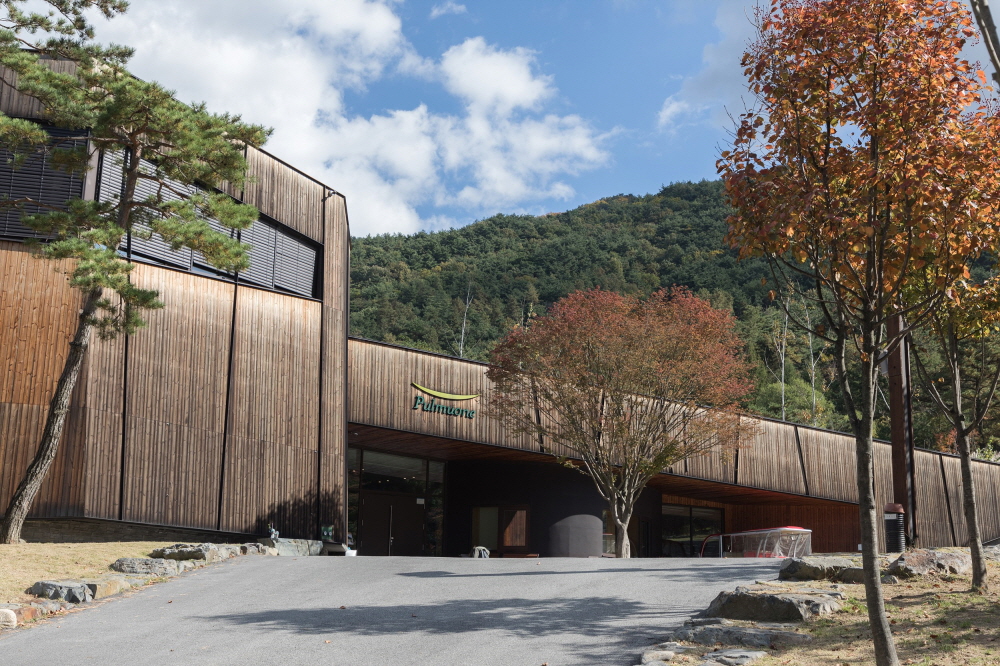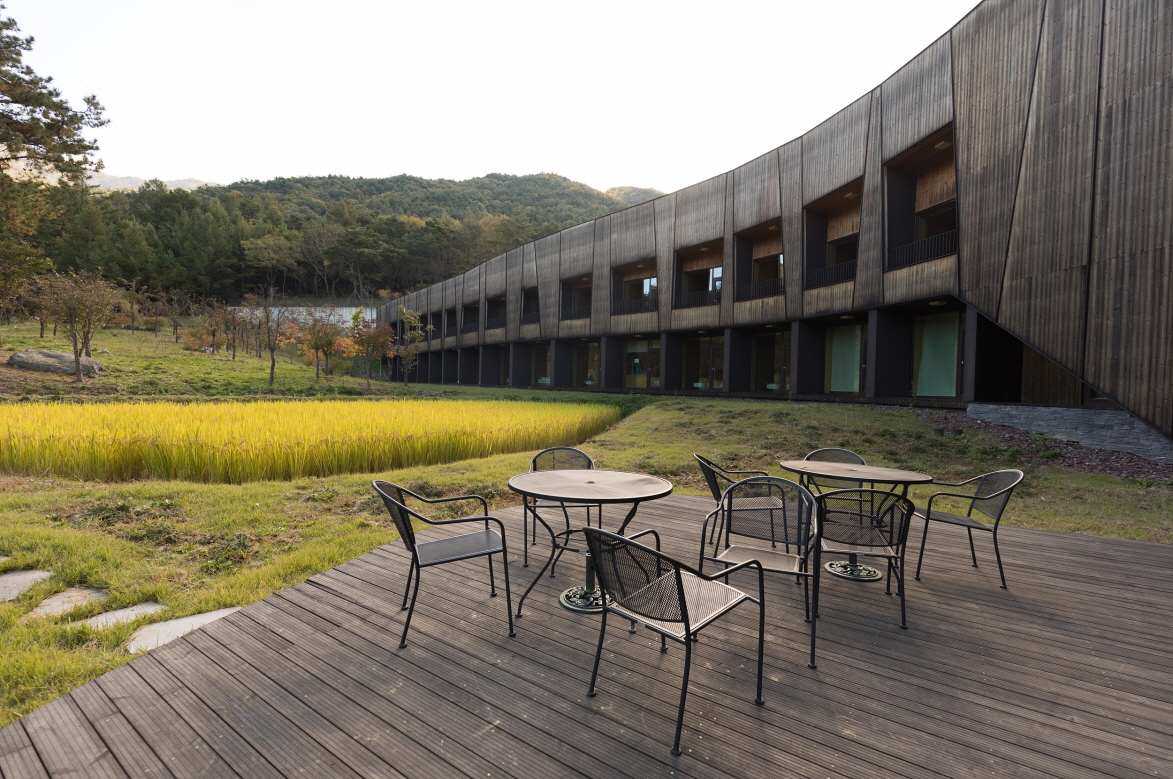Pulmuone receives two special awards from CDP for its voluntary climate change and water management
Pulmuone receives two special awards from CDP for its voluntary climate change and water management
- Pulmuone rated “Leadership A-“ for its response to climate change and water management and awarded two special awards for new participation and improvement in performance
- Pulmuone Foods’ Korean Bean Tofu received “water footprint” accreditation from the Ministry of Environment

▲ Pulmuone practices environment management by actively introducing new renewable energies to use less fossil fuels
Above is a picture of Passive House, a building constructed with cutting edge insulation technology at Pulmuone’s training center complex called LOHAS Academy in Goesan-gun, North Chungcheong province.
Compared to general buildings, it saves energy up to 85% and minimizes carbon emissions by utilizing renewable energy such as geothermal and solar.
Pulmuone’s voluntary efforts to address climate change were well acknowledged and reflected in the global sustainability index.
Pulmuone (CEO Nam, Seung-Woo) announced on October 27 that it has received special awards for “Climate Change” and “Water Management” at the awarding ceremony organized by Carbon Disclosure Project (CDP) Korea Committee. For a food company, Pulmuone is the sole enterprise to win the awards in Korea.
CDP is an organization and a global project that discloses management information related to environment such as greenhouse gas emissions, and responses to environment issues, such as climate change, water, and forest, of major listed companies in different nations. As a non-profit organization located in the UK, it releases rankings every year based on each corporation’s environment management. Also, it is acknowledged as one of the top institute for sustainability evaluation along with the Dow Jones Sustainability Index (DJSI).
The CDP scoring categorizes companies into four bands, which are “Leadership (A),” “Management (B),” “Awareness (C),” and “Disclosure (D).” When a company moves up the ladder, it shows that it is progressing toward environmental stewardship by taking strong initiatives to address climate change such as mitigating greenhouse gas emissions and responsibly manage it.
▲ Inside the Pulmuone’s LOHAS Academ
For its responses to climate change, Pulmuone was awarded the Carbon Management Special Award for new participation.
Pulmuone participated in the Climate Change program for the first time, and was welcomed with a high rating of “Leadership A-.”
The company recognized that taking action on climate change is crucial and has been adopting diverse endeavors to reduce carbon emissions by using less fossil fuels and increasing the share of new renewable energy.

▲ Front view of Pulmuone’s LOHAS Academy
Pulmuone also receives a “special award for improving performance” in water management.
Last year, Pulmuone was ranked at “Management B” for water management, but it was raised to “Leadership A-“ this year. CDP Korea Committee commented that this means Pulmuone “is nearing a stage when it realizes its strategies to resolve water-related risks and issues in the short, mid and long-term.”
In 2016, Pulmuone’s efforts successfully lowered the consumption of process water 5% year on year. It is also applying strict set of rules to manage the quality of treated wastewater when it is released. For instance, Chuncheon tofu and ice plants, and Eumseong vegetable plants control the quality of wastewater so that it is treated to meet agricultural water standards.
Pulmuone Foods’ Korean Bean Tofu (for pan-frying, 300g) wins “water footprint” certification from Korea’s Ministry of Environment on October 25
The water footprint is an index of environmental score, deduced by quantifying the impact of treated wastewater released on water quality, and the amount of water used throughout production, transportation, distribution, usage, and disposal stages. Pulmuone has long-strived to earn the certification in hopes of strengthening sustainability of its products.
Baik, Seok-In, the head of ES/QTM Department in Corporate Technology Office, said, “By participating in the CDP and receiving a high rating, the excellence of Pulmuone’s sustainable management at the corporate level was verified.” He also added that, “As a LOHAS company that loves both human and nature, Pulmuone will continue to add to the momentum of promoting environment management, which includes lowering greenhouse gas emissions, saving energy and water, and using more of new renewable energy.”
On October 27 (Friday) at 3 p.m., the CDP Korea Committee will hold an event to release the 2017 CDP Korea Report, and award companies excelling in addressing climate change, and water management in Orchid Room (2nd floor) at Chosun Hotel. Information collected via the CDP is compiled into a yearly report for financial institutions around the globe to refer to as investment guidelines.
Pulmuone’s training center complex is called LOHAS Academy, which is a Passive House erected with advanced insulation technology in Goesan, North Chungcheong province. It utilizes new renewable energy such as geothermal and solar, saving up to 85% of energy compared to general buildings.
Eumseong and Uiryeong tofu plants of Pulmuone Foods are installed with wood pellet boilers, which are known to be effective in cutting carbon emissions, and Doan plant of Pulmuone Health & Living is equipped with solar power facilities. Moreover, Pulmuone expanded the rate of facilities using renewable energy up to 18% out of its entire production facilities.
In the case of Byeollae and Uijeongbu rest stops operated by EMCD, a subsidiary of Pulmuone for living services, solar power generating facilities were established at the rooftops, and the Yangpyeong rest area replaced 85% of its heating devices to induction cooktops.









